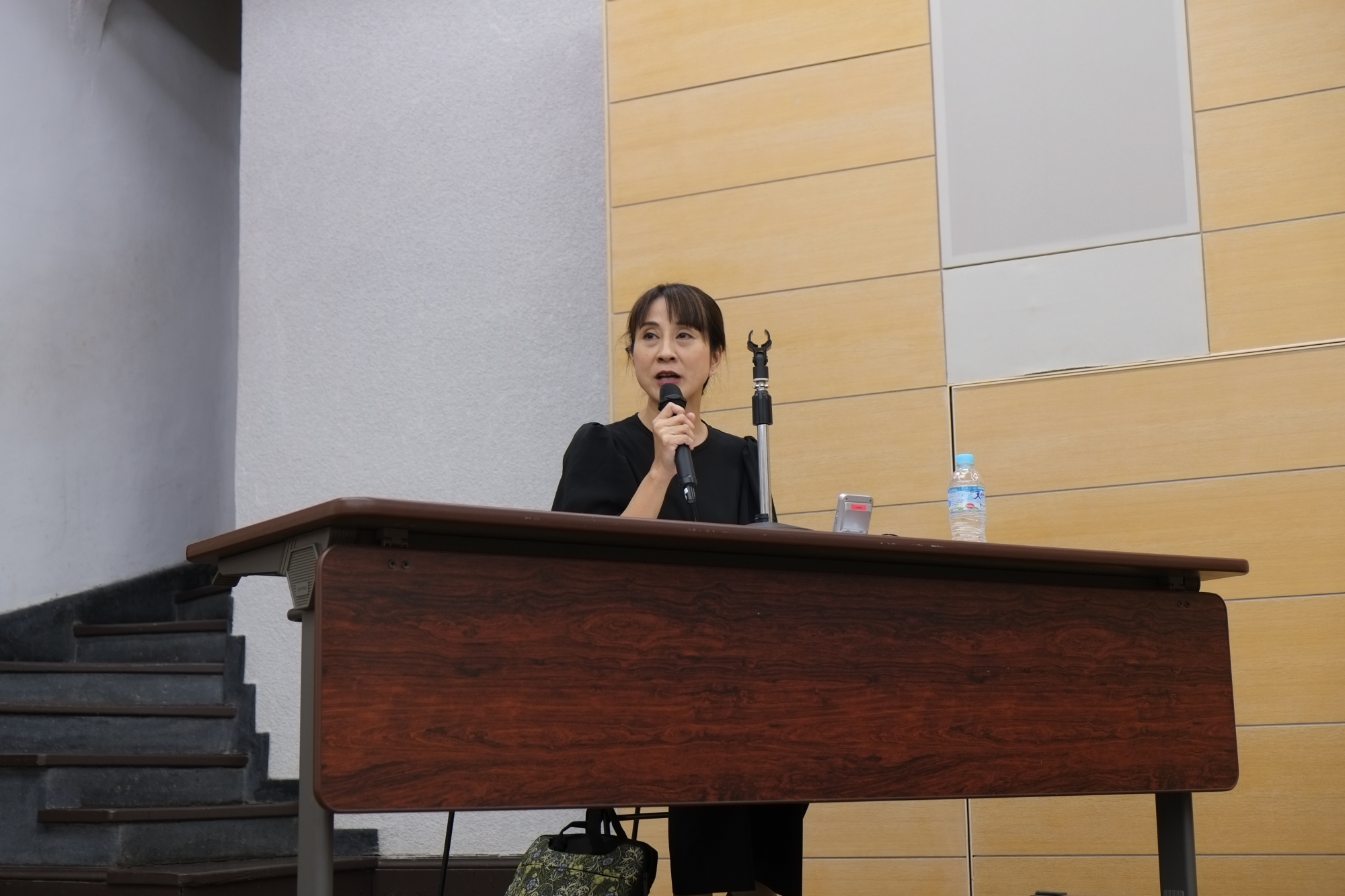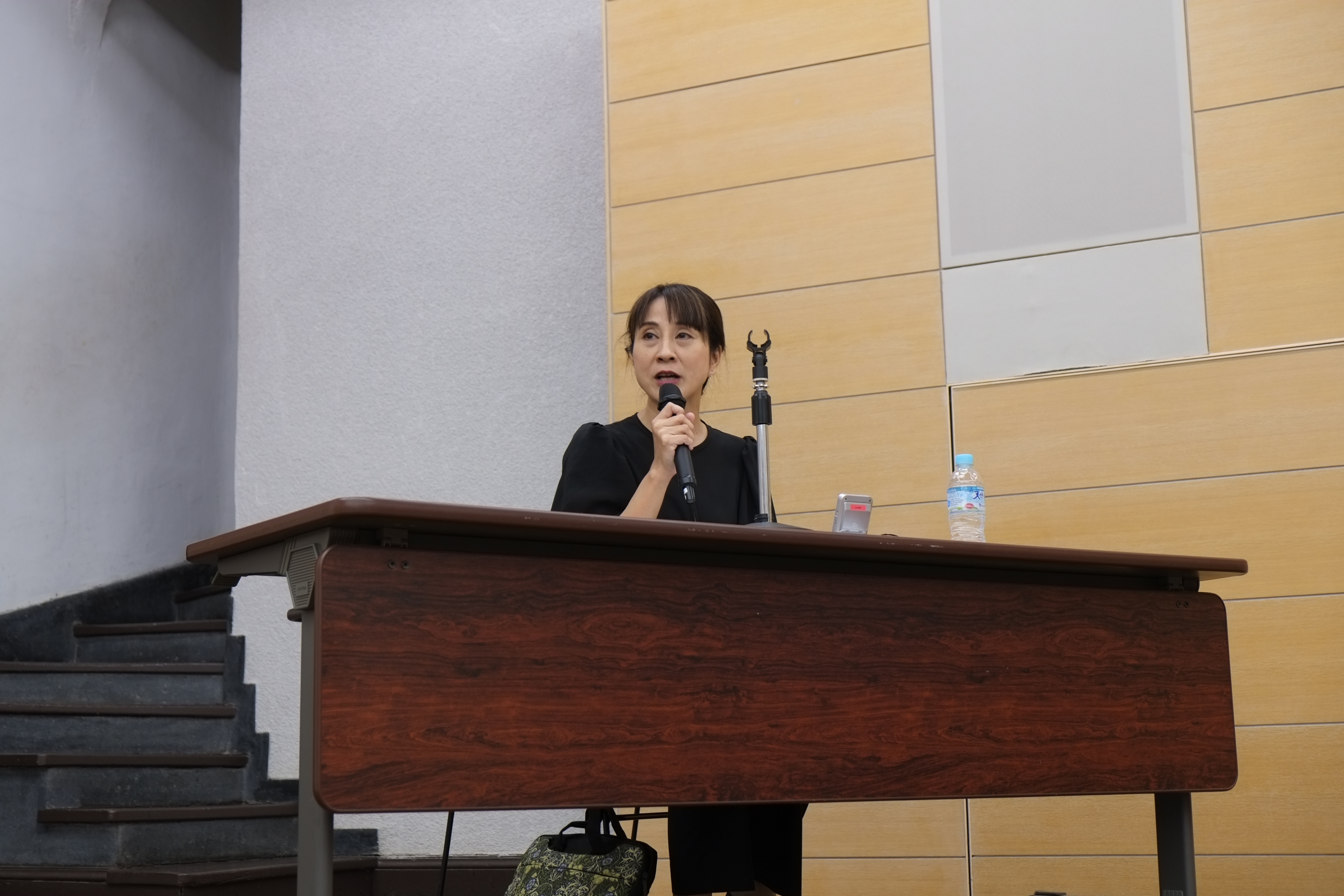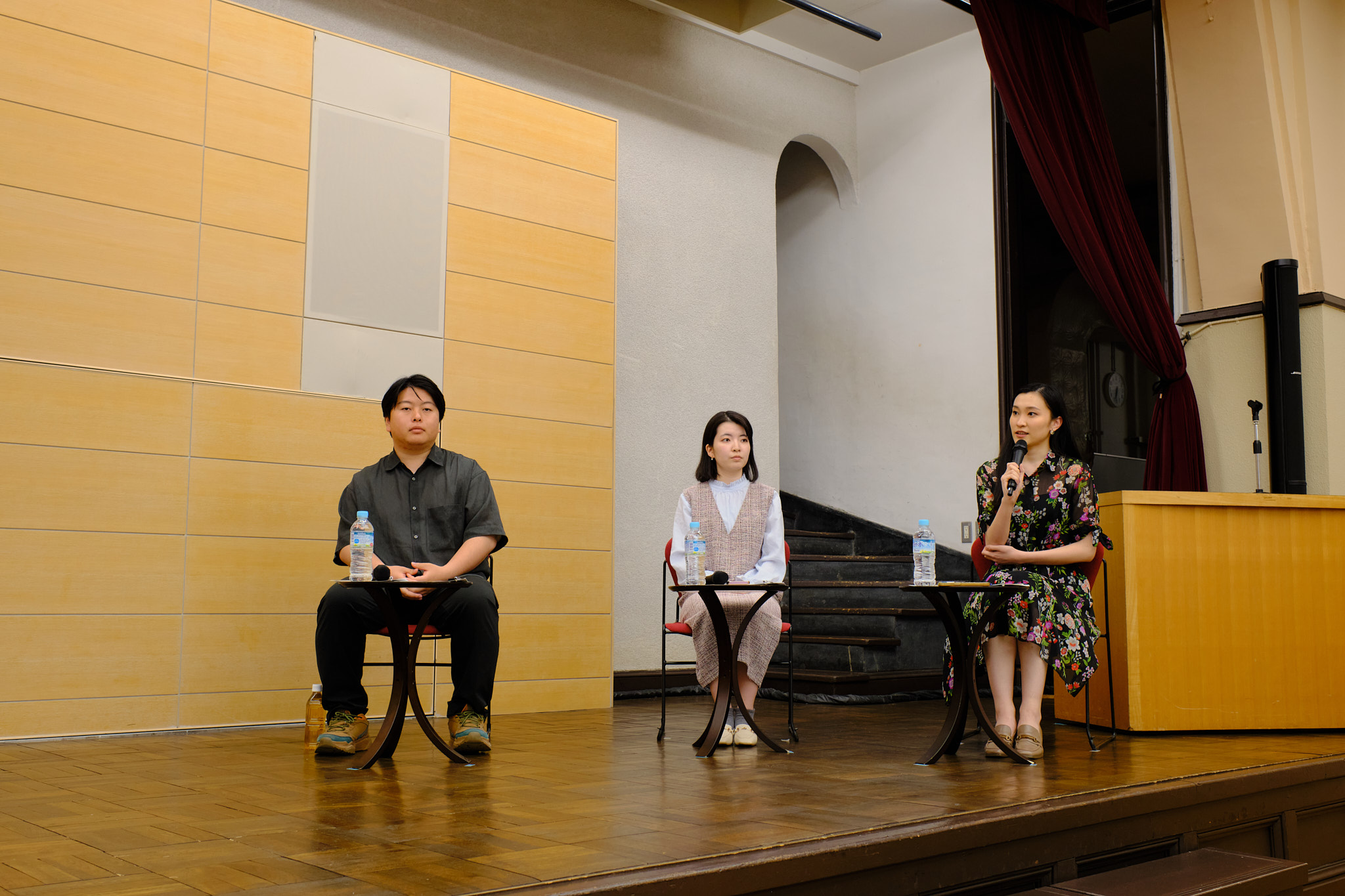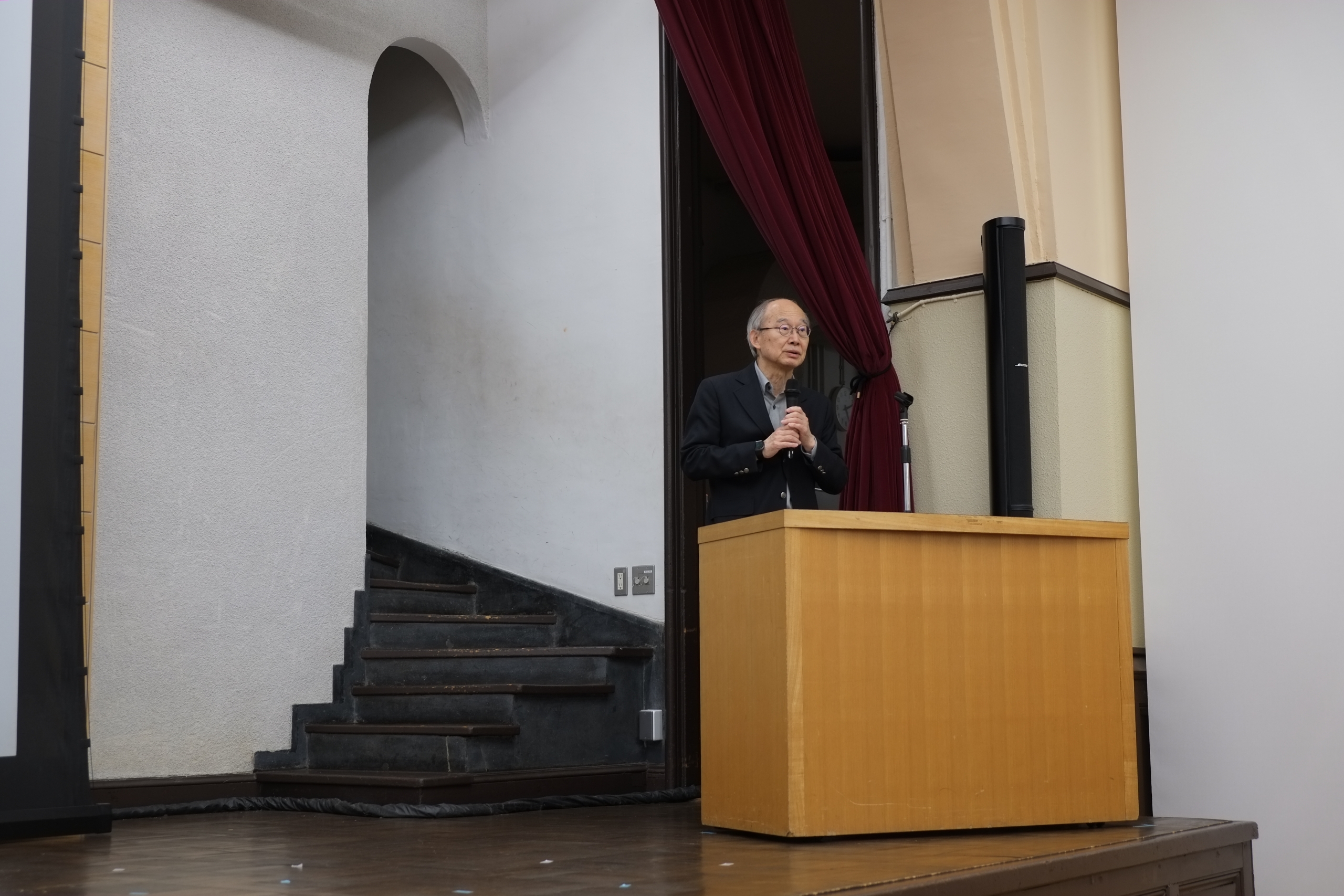The Power of Journalism: Shedding Light on Okinawa’s PFAS Water Crisis
Thu, Jul 4, 2024-
Tags
Introduction
On May 17, 2024, Waseda University hosted an event, with support from the Ryukyu Asahi Broadcasting Corporation, titled “Nuchi nu Miji – Okinawa’s Water of Life” ―Working Together to Address the Issue of Water Pollution by Military Bases as part of Museum Week. Through a screening of the documentary “Nuchi Nu Miji – Okinawa’s Water of Life”, which received the 2023 Waseda Journalism Award in memory of Ishibashi Tanzan, and a panel discussion between one of its directors, Natsuko Shimabukuro, and Waseda students, the event captured the pressing issue of PFAS (Perfluoroalkyl and polyfluoroalkyl substances) contamination in Okinawa, particularly stemming from U.S. military bases. Overall, the event highlighted the historical, environmental, and human impact of this persistent pollutant.
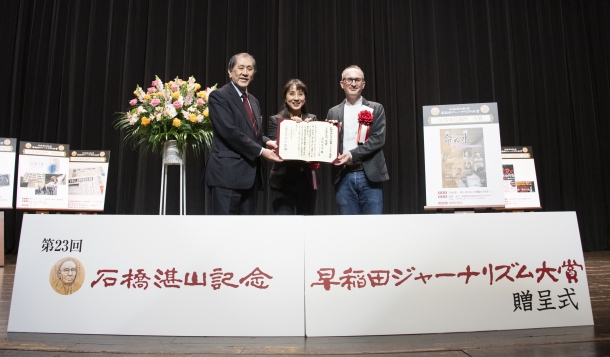
Waseda President Aiji Tanaka, Director Natsuko Shimabukuro, Director Jon Mitchell receiving the 2023 Waseda Journalism Award in memory of Ishibashi Tanzan
Documentary Screening and Discussion
The event began with an introduction by Professor Shiro Segawa from Waseda University’s Faculty of Political Science and Economics. He emphasized the complexity of solving environmental issues like PFAS contamination, urging the audience to think critically and collaboratively about potential solutions. The screening of the 70-minute documentary co-directed by Natsuko Shimabukuro, a journalist with Ryukyu Asahi Broadcasting Corporation, and freelance journalist Jon Mitchell followed. This documentary provided a comprehensive look at the water pollution caused by the forever chemical PFAS contained in the firefighting foam used by the US military. It covered contamination stemming from various U.S. military bases, and their detrimental effects on local water sources. The origins and dangers of PFAS are scrutinized, detailing its widespread impact on Okinawa’s water supply and beyond. It also illuminated the persistent efforts of the Okinawan people to gain recognition for the issue, as well as the reluctance of both the U.S. and Japanese governments to take effective action in addressing the contamination.
Historical Context and Personal Stories
The documentary delved into the discovery of PFAS in 2016 in the Dakujaku River, affecting the drinking water of 450,000 people. Through personal stories, it illustrated the ongoing battle for recognition and action. One notable story was of Yoshiyasu Iha, a retired high school science teacher who is tirelessly fighting to have the PFAS issue acknowledged by the local government. Another was of Naomi Machida, a restaurant owner with a large family, who became an advocate for clean water after realizing the potential health risks to her children and grandchildren.
The documentary also highlighted the experiences of Andrea Amico, a mother in the U.S. who has been fighting for PFAS recognition. Her story underscored the global nature of the issue, emphasizing that it is not just an Okinawan problem but a worldwide crisis. The personal narratives were preceded by scenes from the Okinawa war, highlighting the long history of struggle and resilience of the Okinawan people amid hardships. For generations, they have found strength and unity through the lifeblood of their community—the ground water. However, this very groundwater, once a symbol of their connection and resilience, has now become a perilous threat due to PFAS contamination.
Scientific Insights and Government Inaction
“Nuchi Nu Miji – Okinawa’s Water of Life” provided a stark look at the scientific and governmental response to PFAS contamination. Despite evidence linking PFAS to various health issues, including cancer and low birth weights, the national government has been slow to act. Instead of enforcing stricter regulations or pressuring the U.S. to cease using PFAS, the government provided funds and materials to Okinawa for water purification.
The documentary featured experts like Professor Akio Koizumi from Kyoto University, who has been researching PFAS and its effects on human health. His studies suggest that PFAS may cause low birth weights, but he calls for more comprehensive research, especially involving pregnant women. The film also showed the plight of residents near an elementary school in close proximity to the Marine Corps Air Station Futenma, where firefighting foam containing PFAS contaminated the nearby water, posing risks to the children.
Panel Discussion with Students and Shimabukuro
Following the screening, Shimabukuro and three Waseda University students engaged in a lively discussion that brought multiple perspectives to the forefront. Rikuto Sato, a master’s student in the Graduate School of Advanced Science and Engineering emphasized the importance of scientific literacy and the need for critical thinking about everyday conveniences, highlighting the role of journalism in disseminating this information. He remarked on the hidden dangers in daily life and the necessity of understanding these risks to prevent long-lasting negative impact.
Rika Nishihara, a master’s student in the Graduate School of Letters, Arts and Science, expressed her frustration with the slow progress of governmental investigations despite residents’ complaints. She emphasized the power of documentaries to make societal issues relatable and personal, stressing that public awareness is crucial for driving change
Tamaki Hoshi, a master’s student in the Graduate School of Social Sciences who grew up in the U.S., discussed the intersection of social identity and environmental activism. She highlighted the global nature of the PFAS issue, stating that it is not just an Okinawan problem but a worldwide crisis. Hoshi emphasized the importance of transparent dialogues and collaborative efforts to find solutions.
Shimabukuro appreciated the fresh perspectives brought by the students and shared the challenges she faced in reporting on PFAS due to a lack of scientific knowledge shared among the public pertaining to the issue, leaving them to be rather indifferent about the topic. She emphasized the role of community engagement and local journalism in tackling such complex issues, highlighting the overwhelming response from the public who continue to contact her office seeking advice on safe water.
The discussion concluded with a consensus on the need for continued research, better regulations, and increased public awareness to address the pressing environmental issue effectively. The panel underscored that solving the PFAS problem requires a multifaceted approach, blending scientific, social, and personal perspectives, and emphasized the importance of thinking critically and acting responsibly to protect water and health.
Call to Action
The event concluded with closing remarks from Professor Segawa, who reiterated the importance of journalism, scientific literacy, and community engagement in addressing environmental issues. He stressed that PFAS contamination is not just an Okinawan problem but a global one that affects human rights and quality of life.
The students and Shimabukuro agreed that increased research, better regulations, and international cooperation are keys in mitigating the PFAS issue. They called for more awareness and action from both the government and the public to ensure a safer future for all.
Conclusion
The event “Nuchi nu Miji – Okinawa’s Water of Life”-Working Together to Address the Issue of Water Pollution by Military Bases at Waseda University shed light on the severe and persistent issue of PFAS contamination in Okinawa. Through the poignant documentary and subsequent discussions, it became eminent that addressing this problem requires a concerted effort from all sectors of society. The stories of resilience and advocacy showcased during the event serve as a powerful reminder of the importance of clean water and the need for ongoing vigilance and action to protect it.
*This article was written by the following Student Contributor:
Seungjae Bae
School of International Liberal Studies
- Links


